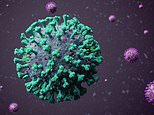Health chiefs declare two new ‘variants of concern’
<!–
<!–
<!–<!–
<!–
(function (src, d, tag){
var s = d.createElement(tag), prev = d.getElementsByTagName(tag)[0];
s.src = src;
prev.parentNode.insertBefore(s, prev);
}(“https://www.dailymail.co.uk/static/gunther/1.17.0/async_bundle–.js”, document, “script”));
<!–
DM.loadCSS(“https://www.dailymail.co.uk/static/gunther/gunther-2159/video_bundle–.css”);
<!–
Two types of the Omicron variant of Covid-19 have been newly classified as variants of concern in the UK.
Only a small number of cases of Omicron BA.4 and BA.5 have been identified in Britain so far.
But analysis of the available data suggests they are likely to have a ‘growth advantage’ over Omicron BA.2, currently the dominant variant, according to the UK Health Security Agency (UKHSA).
UKHSA said there could be many reasons why the new variants have a growth advantage over BA.2 but lab tests suggested they are likely to have some ability to evade the protection provided from previous infection and vaccines.
As of May 20, 115 cases of probable or confirmed BA.4 had been identified, with 67 in England, 41 in Scotland, six in Wales and one in Northern Ireland.
Some 80 cases of BA.5 have been identified, with 48 in England, 25 in Scotland, six in Northern Ireland and one in Wales.
UKHSA said further studies on the new variants are underway.
Concerns over the new variants comes as the latest data shows Covid cases have continued to collapse in England with the outbreak now reaching its lowest level since mid-December last year.
Only a small number of cases of Omicron BA.4 and BA.5 have been identified so far, but analysis of the available data suggests they are likely to have a ‘growth advantage’ over Omicron BA.2, currently the dominant variant, according to the UK Health Security Agency (UKHSA)
The Office for National Statistics (ONS) estimates just over one million, or one in 55 people, had the virus on any day in the week to May 13. This is down week-on-week from 1.2 million, or one in 45.
Similar falls were recorded in the other UK nations, with just one in 45 people in Scotland, one in 40 in Wales and one in 60 in Northern Ireland estimated to have the virus.
This is now the sixth week in a row that the ONS’s weekly survey — now the best barometre of the outbreak — has reported a week-on-week fall in cases, despite no Covid restrictions being in place.
The Government is relying on the study, based on swabs of 120,000 random people, to track the virus now that free testing has been axed for the vast majority of Britons.
In total, infections are now roughly a quarter what they were at the peak of the recent Omicron wave at the end of March, when a record 4.9 million people were estimated to have Covid.
Covid numbers for last week are now back to levels last seen in early December, when infections had just started to rise due to the spread of the original Omicron variant.
![]()


